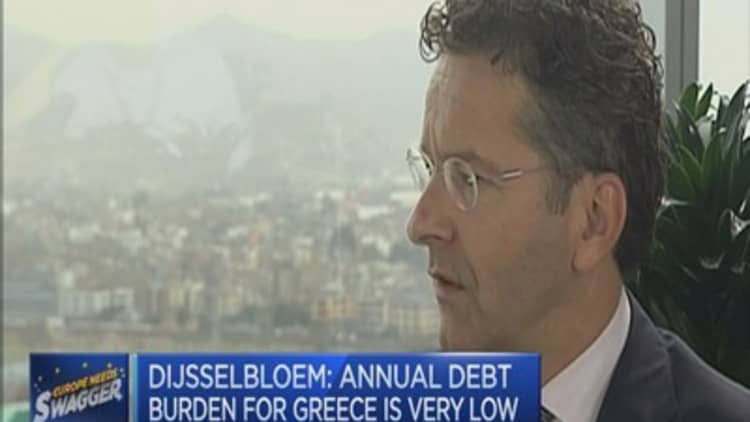Puerto Rico could be completely illiquid by November, pushing it closer to defaulting on major debt payments, the territory's top officials said Thursday.
Without support from the U.S. federal government, "Puerto Rico may have to choose between paying its creditors and providing essential services to the island's 3.5 million American citizens," the Governor of Puerto Rico, Alejandro Garcia Padilla, told lawmakers at a Senate hearing on Thursday.
Details of just how severe Puerto Rico's short-term liquidity crisis has become were outlined in the Governor's written statement.
"Based on current information the Commonwealth will have a negative cash balance of $29.8 million in November 2015," and Puerto Rico's "illiquidity will only grow worse when a $355 million debt service payment on bonds of the Government Development Bank (GDB) comes due on December 1."
Read MoreHow can Puerto Rico get out of this 'mess'?
Based on current information, "the GDB, which faces its own liquidity crisis, is not expected to be able to make the payment," to its bondholders, the statement added.
Antonio Weiss, the Counselor to the U.S. Treasury Secretary, outlined the key details of the Obama administration's proposed policy changes to help aid the cash-strapped island.
The plan, unveiled late Wednesday, includes an unprecedented "Super Chapter 9" proposal to create a restructuring framework that is reserved exclusively for U.S. territories. The proposal would give Puerto Rico access to Chapter 9 - a chapter of the U.S. Bankruptcy Code that allows local and state governments to restructure their debt - to restructure not just its municipalities' debts, but also allow the Commonwealth as a whole to restructure its debt under U.S. bankruptcy laws.

Some experts, including Daniel Hanson, an analyst at Height Securities who attended the hearing, believe the proposed "Super Chapter 9" is a non-starter. In a research note issued Thursday, Hanson puts the odds of Congress passing the extraordinary measure at "below 5 percent," adding that it is "extraordinarily unlikely that Congress would find such legislation to be consistent with a contemporary Republican fiscal posture."
Before Congress moves forward with , a large issue will likely need to be rectified; the Commonwealth needs to provide transparent and verifiable financial data for the committees to evaluate.
Gov. Padilla told the lawmakers that it may still be "weeks or months" until financials for fiscal year 2014 are ready for congressional review.
Despite this setback, Counselor Weiss, who is leading the Obama administrations' efforts to provide assistance to PR, assured the committee that Treasury "will apply all of its efforts, creativity and resources" to find a resolution to the indebted island's financial crisis.
Read MorePuerto Rico could become 'humanitarian crisis': TreasuryCounselor
Observers of Puerto Rico bonds are skeptical of Treasury's plans, with some questioning the legality of a Super Chapter 9 restructuring.
"Under current federal law this is not permitted," said David Tawil, co-founder and President Maglan Capital, who believes that if Congress were to pass this type of framework for debt restructuring, holders of Puerto Rico's paper who are forced to take haircuts "will have quite a strong legal argument".
Tawil, who specializes in corporate distressed debt situations, also noted that the proposal would likely have huge detrimental effects on bondholders.
Another potential unintended consequence of the Super Chapter 9 proposal is the impact on the muni debt markets.
Read MorePuerto Rico ends talks with bondholders as deadline looms
"The Administration's unprecedented proposal, so-called "Super Chapter 9", would restructure all of Puerto Rico's debt, including its Constitutional debt, and is widely expected to disrupt U.S. municipal debt markets raising the cost of borrowing for states and municipalities across the country", The Main Street Bondholders Coalition said in a statement.
George Carroll, a member of the Main Street Bondholders and retired municipal bond adviser, bought Puerto Rico General Obligation bonds for his retirement portfolio specifically because of their constitutional guarantee.
Carroll, who has been in the muni bond and finance business for 38-years, said the Super chapter 9 proposal was not only reckless, but would put Americans' retirement accounts at risk.
"Impairing constitutionally protected general obligation bonds will bring chaos to America's municipal bond market. This will spurt other states from New Jersey to Illinois to ask for Super Chapter 9, and the result would be a disaster for millions of American retirees who are invested in state and local general obligation bonds.

